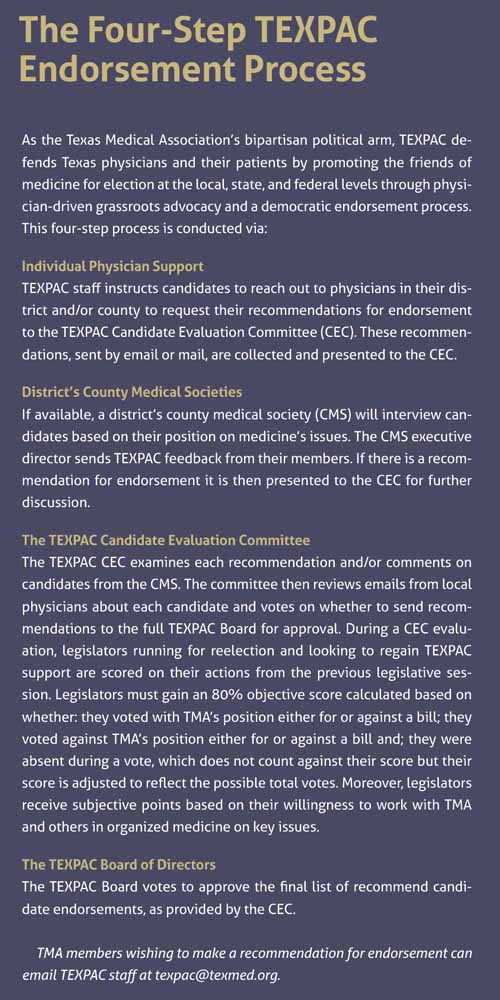
Before becoming a member of the TEXPAC, TMA’s bipartisan political action committee, San Antonio pediatric anesthesiologist John Shepherd, MD, worried the group’s candidate evaluation process would favor one political party over the other.
By meeting with TEXPAC-affiliated colleagues and legislators at TMA advocacy events like First Tuesdays at the Capitol, however, Dr. Shepherd quickly found that was “not the case.” Regardless of political affiliation, each TEXPAC member he spoke to had one, singular mission in mind: to defend medicine.
Moreover, when Dr. Shepherd became a member of the TEXPAC Candidate Evaluation Committee (CEC) – and eventually its chair – he found its methods in choosing to endorse a candidate were both “robust and reassuring.”
“Candidates are evaluated based on their relationship with medicine, including if they’ll vote in favor of medicine’s issues or if they speak regularly to local physicians,” Dr. Shepherd told Texas Medicine. “What is best for Texas doctors is best for TEXPAC.” (See “Power PAC,” page 16.)
And the robust process has resulted in success: 97% of TEXPAC-endorsed candidates have gone on to win their elections.
Candidate scoring
Christine Mojezati, who was TEXPAC director at the time this article was written, says party affiliation of candidates is not a factor in endorsement other than in the consideration of demographics and ability to win. More importantly, TEXPAC bases its endorsement on the candidate’s support of medicine’s agenda, including in the previous legislative session, if the candidate is an incumbent member of the legislature.
Additionally, TEXPAC only approves of a candidate or re-endorses a legislator after a stout evaluation process that allows members in organized medicine at “every stage” to submit input into potential TEXPAC endorsements, Dr. Shepherd says. (See “The Four-Step TEXPAC Endorsement Process,” page 24.)
For example, a candidate can only be considered for endorsement after physicians recommend them to TEXPAC staff. Generally, candidates are also interviewed by local county medical societies (CMSs) on their positions on health care issues and their willingness to meet with members of organized medicine, among other qualifiers.
Tarrant County Medical Society Executive Vice President Brian Swift says the involvement of local CMS members and physicians in the evaluation process allows local members of organized medicine to be “the first contact” for potential legislators to learn about health care issues – and one of the first filters for TEXPAC to screen its prospective endorsees.
“This makes it easy for us to decide if they are going to be good stewards of medicine or if they will serve other interests,” Mr. Swift said. “Not all candidates receive CMS or TEXPAC approval – only the most inclined in medicine’s favor.”
The CEC then reviews comments and recommendations from local CMS members and testimony from physicians in the area to vote on whether to send endorsements to the full TEXPAC Board for approval.
Additionally, previously elected legislators – who’ve gleaned a TEXPAC endorsement in the past and are running for reelection – are also reevaluated during this time. During the CEC’s assessment, committee members use a score card to calculate a sitting legislator’s effectiveness on behalf of medicine, Ms. Mojezati says.
To regain TEXPAC approval, these legislators must receive an 80% minimum score calculated in two main areas – if they voted with TMA on key issues and if they worked well with TMA staff and lobbyists during session.
Dr. Shepherd says this process also allows CEC members to reexamine “middle ground” legislators based on their relationship with their local CMS.
“When we look at debatable candidates that we’re having questions about, the CMS perspective really comes into play,” he said. “Some might be inclined to move on from lawmakers who only vote with us half of the time, but I’ve seen many legislators who’ve historically voted against us change their minds because of a relationship with their local CMS.”
On the other hand, TMA Council on Legislation Chair Zeke Silva, MD, says he’s witnessed legislators who’ve lost TEXPAC support fail to win their reelection campaigns.
“A relationship with TEXPAC extends past endorsement and election. It is a continuous, longitudinal marathon,” the San Antonio radiologist said. “Legislators who do not champion medicine the way TMA sees fit will absolutely lose TEXPAC support, and very often those who do, fail to regain their seats.”

Physicians For Program
Through another important facet of the endorsement process, TEXPAC provides its members with resources and materials to campaign for their preferred candidates – even if they do not receive a TEXPAC endorsement.
Via the Physicians For Program, TEXPAC members can receive:
- Mailing labels for all physicians in the House or Senate district where they reside;
- Promotional help when hosting events like meet and greets or fundraisers; and
- Guidance on how else to help candidates.
Through this program, Ms. Mojezati says physicians are given the opportunity to continue to support the candidates of their choice – and to sometimes see them win. She recalls when a TEXPAC-endorsed incumbent lost a senate race to another candidate backed by local physicians.
Although the opposing candidate was not officially TEXPAC-endorsed, it was still a positive win for organized medicine.
“Because we had physicians leading the charge of supporting the other candidate, we were able to easily enter into a positive relationship with the new incoming senator,” she said.
Dr. Silva says it is equally important to build relationships with both TEXPAC-backed lawmakers and those who have not yet received an endorsement. In fact, he likens that belief to TMA Alliance President and TEXPAC board member Jenny Shepherd’s “power of one” refrain.
“Our members have to feel that in a time of opportunity or challenge within their lives and within their practices, that TMA can be a ramp to success,” Dr. Silva said. “The power of one is the ability of one person, one organization, or one relationship to make a difference. We [TEXPAC] harness the power of one collectively to represent the individual voice of the physician.”